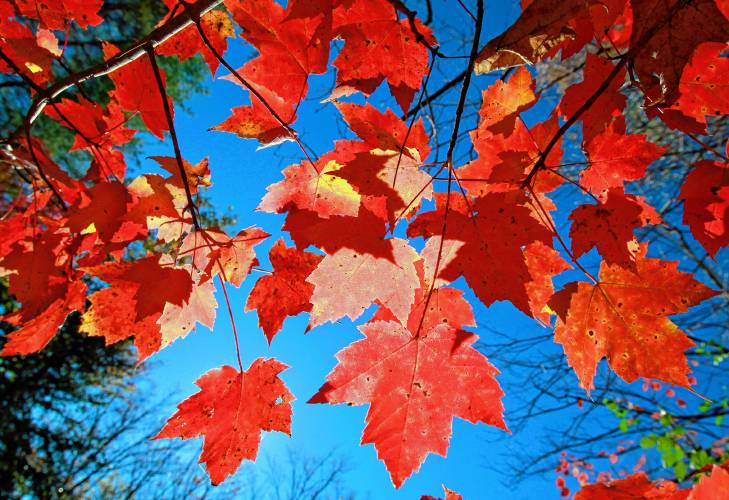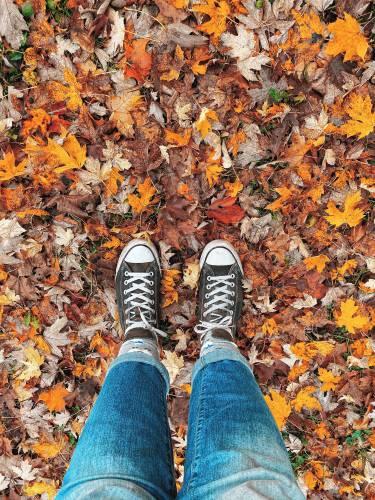Guest columnist Elizabeth Volkmann: Leave the leaves
| Published: 11-25-2023 7:15 AM |
Now that our first frost has brought our sweet autumn weather to an end, the colorful leaves that delivered such joy have lost their grasp and fluttered to the ground. Browned, dried and litter-like, they invite our immediate impulse to mow, mulch, bag and blow them out of sight. But wait!
The leaves that once pulled sunlight into growing trees, protected nesters, provided shade, and put on a colorful show before dancing to the ground are not done with their life-giving mission.
Never producing “waste,” Nature has not only created a wonderful fertilizer and insulator for the ground by dropping leaves, but it has also put the leaves to work as insect incubators.
All of the insects that visit our gardens in the warmer months do not just disappear and magically reappear in the spring. In every stage of development — egg, larva, pupa, adult — insects (and many other invertebrates) are right here beneath our soil, tucked into the bark of trees, under cover of logs and stones, and among the leaves!
Those woolly-bear caterpillars that bring such joy? They are in search of leaves to keep them warm through the winter. Hairstreaks lay eggs on oak leaves, the perfect first meal in spring. Luna moth cocoons are encased in leaves, and swallowtail chrysalis blend right in.
Bumblebee queens burrow barely an inch or two underground and depend upon a cover of leaves to protect her from freezing temperatures. Snails, worms, beetles, spiders and more are relying on nature’s natural cloak to give them the best chance of winter survival and to provide sustenance for other animals.
There is an increasing awareness that our modern practice of blowing, bagging, vacuuming and mulching leaves in favor of a tidy lawn may have detrimental consequences for our insect populations. The declines we read about are not happening elsewhere; they are happening everywhere. Rather than throw up your hands and claim defeat at any chance of improving the world, you can take a rest this year, literally, and leave the leaves!
Imagine by doing nothing, you can do something!
Article continues after...
Yesterday's Most Read Articles
 Graduating amid signs of protest: 6,800 UMass students receive diplomas at ceremony briefly interrupted by walk out
Graduating amid signs of protest: 6,800 UMass students receive diplomas at ceremony briefly interrupted by walk out
 Fire at Rainbow Motel in Whately leaves 17 without a home
Fire at Rainbow Motel in Whately leaves 17 without a home
 Scott Brown: Road to ruin for Northampton schools
Scott Brown: Road to ruin for Northampton schools
 Track & field: Holyoke girls 4x100 relay team wins WMass title, eyes historic trip to Nationals
Track & field: Holyoke girls 4x100 relay team wins WMass title, eyes historic trip to Nationals
 Amherst’s Moriah Luetjen, Logan Alfandari each win 2 titles, Northampton girls dominate en route to team title at Western Mass. Division 1 Track & Field Championships (PHOTOS)
Amherst’s Moriah Luetjen, Logan Alfandari each win 2 titles, Northampton girls dominate en route to team title at Western Mass. Division 1 Track & Field Championships (PHOTOS)
 Summer on Strong kicks off Wednesday in Northampton
Summer on Strong kicks off Wednesday in Northampton
Leaving the leaves may sound radical. You might worry about the effects on your grass. You might be concerned about appearing lazy. But the more you learn about the ecological benefits of minimizing your autumn yard care, the more you will be convinced that leaving the leaves outweighs your worries.
The more you see your leaf-scattered lawn as an insect habitat in the same way you see you flower gardens as a pollinator gold mine, you may slowly become a convert to this new-yet-old way of caring for your plot of earth.
I rely on the science-based invertebrate conservation organization, Xerces, for much of my pollinator practices, and their website provides a host of information about how and why to up your game in protecting our shared insects. Typing “leave the leaves in Massachusetts” into your search engine will provide a list of numerous organizations that are proponents of the campaign to leave the leaves. Even the government has a page on the benefits of leaving the leaves.
If you are skeptical or unwilling to leave the leaves on your lawn, you might consider raking them around trees and shrubs and covering flower beds, as I do.
Perhaps there is a section of your yard that could hold a pile or two of leaves. Maybe try raking some of the leaves over a small patch of garden this year and see how it goes. This not an all-or-nothing practice. It’s simply about awareness and doing what we can to coexist with all the creatures in our midst, even the smallest ones.
Back in the 17th century, Maria Merian proved wrong the generally held belief that insects were born from the ground by documenting the stages of metamorphosis. Her work enlightened the sciences by observing the “unseen” and set the foundation for the study of entomology. There is so much we don’t know about the invertebrate world and so much we still have to learn.
While the news about animal loss and extinction can be disheartening, we can embrace the little things we can do to make the world a better place, for each other and for the species we depend upon and delight in, even when we can’t see them.
Elizabeth Volkmann of Northampton is an aspiring children’s book writer, backyard gardener, and curious observer of the natural world.



 Columnist Sara Weinberger: Republicans calling antisemitism over protests is bad-faith politics
Columnist Sara Weinberger: Republicans calling antisemitism over protests is bad-faith politics Guest columnist Rob Moir: Unraveling the mystery — Warmer sea, cool land
Guest columnist Rob Moir: Unraveling the mystery — Warmer sea, cool land Marc Lussier: Fund the schools
Marc Lussier: Fund the schools Mary Hall: Northampton should set up charitable fund for schools
Mary Hall: Northampton should set up charitable fund for schools
